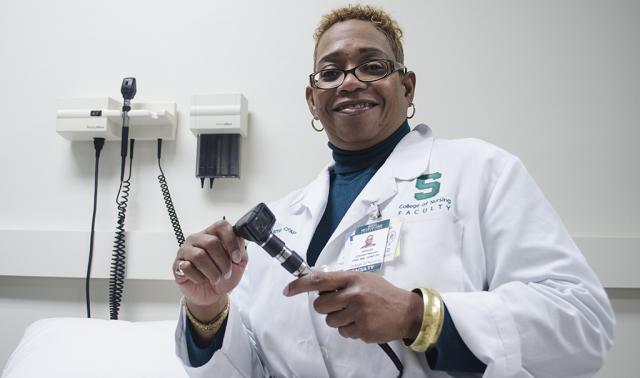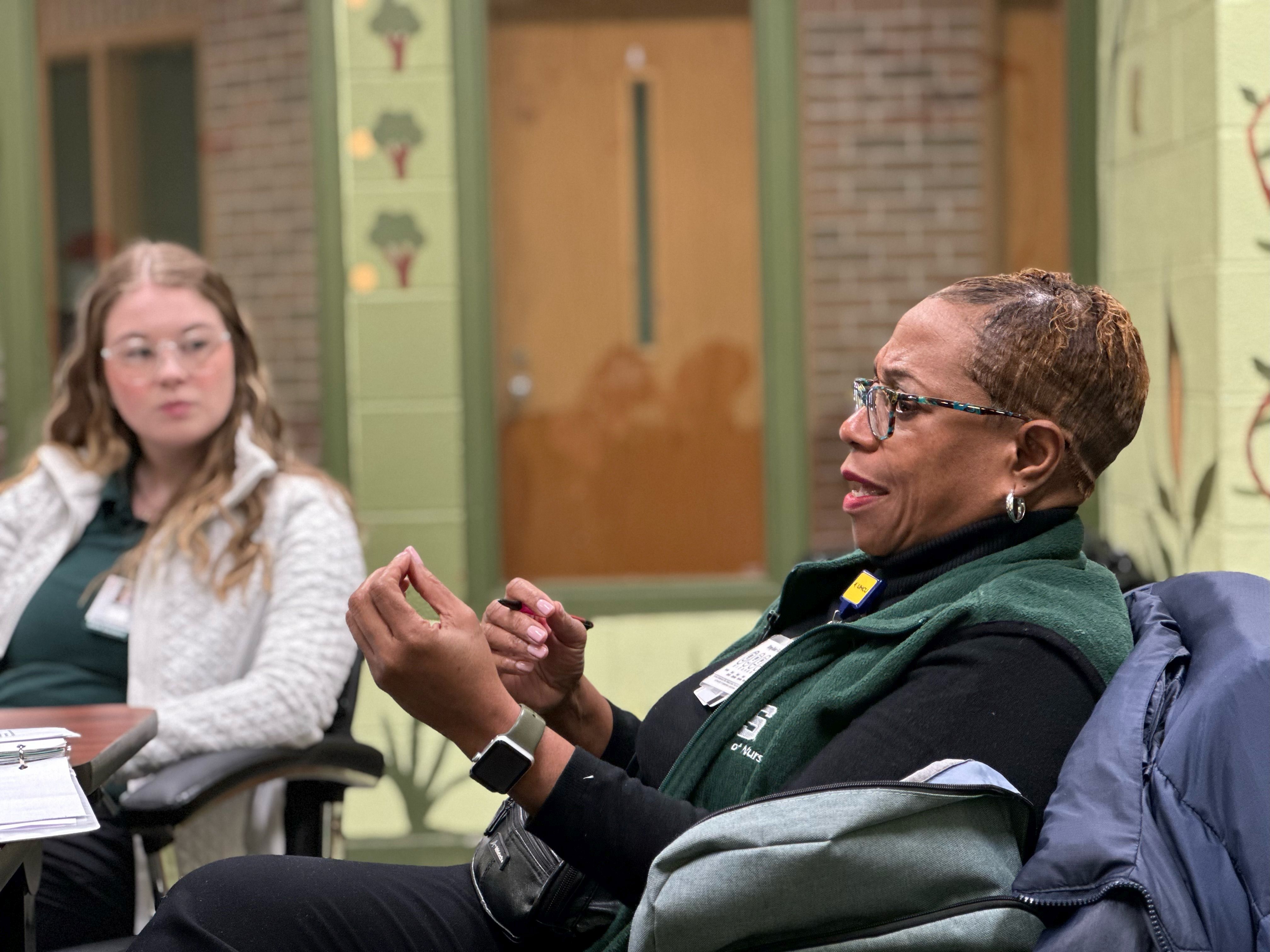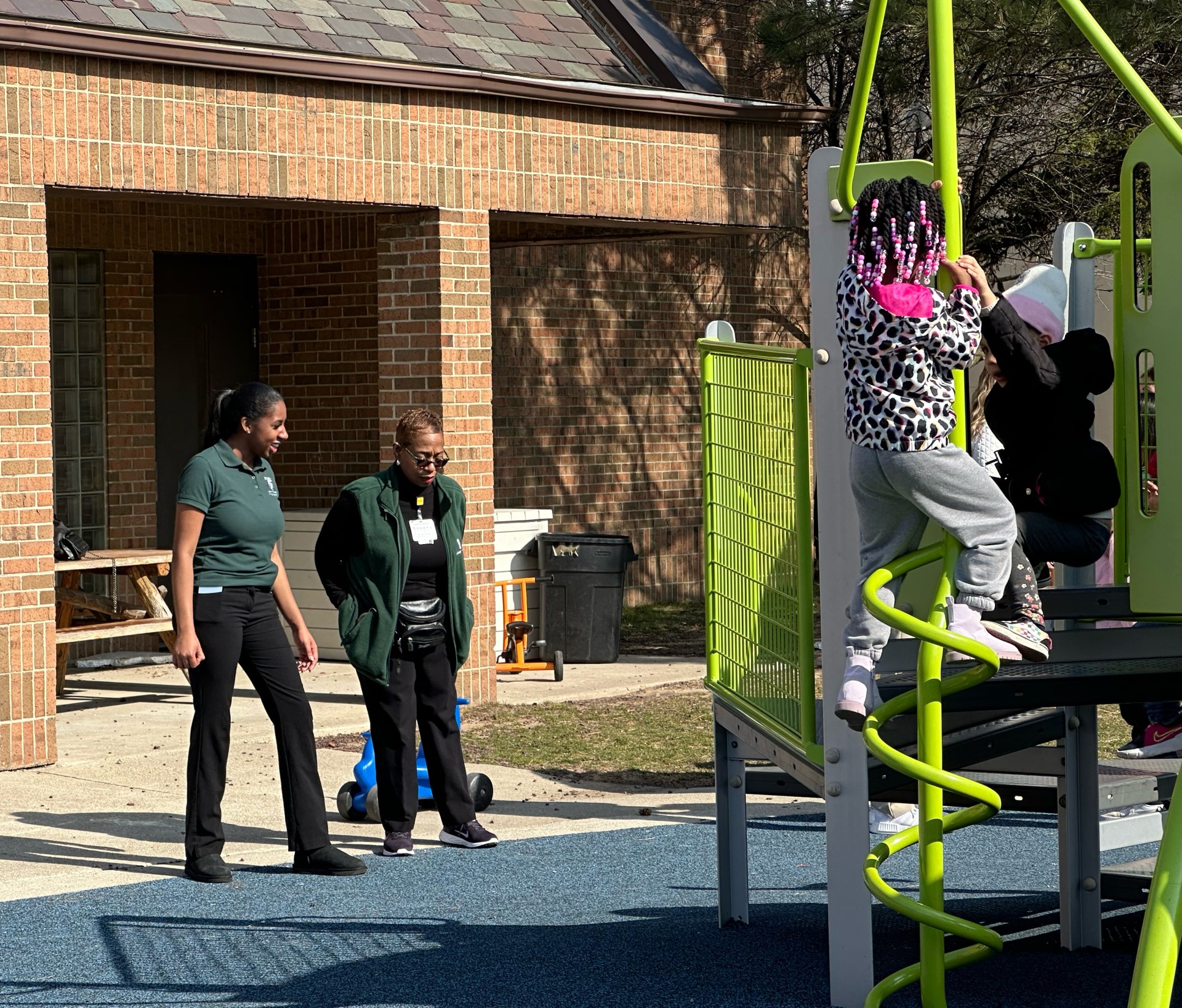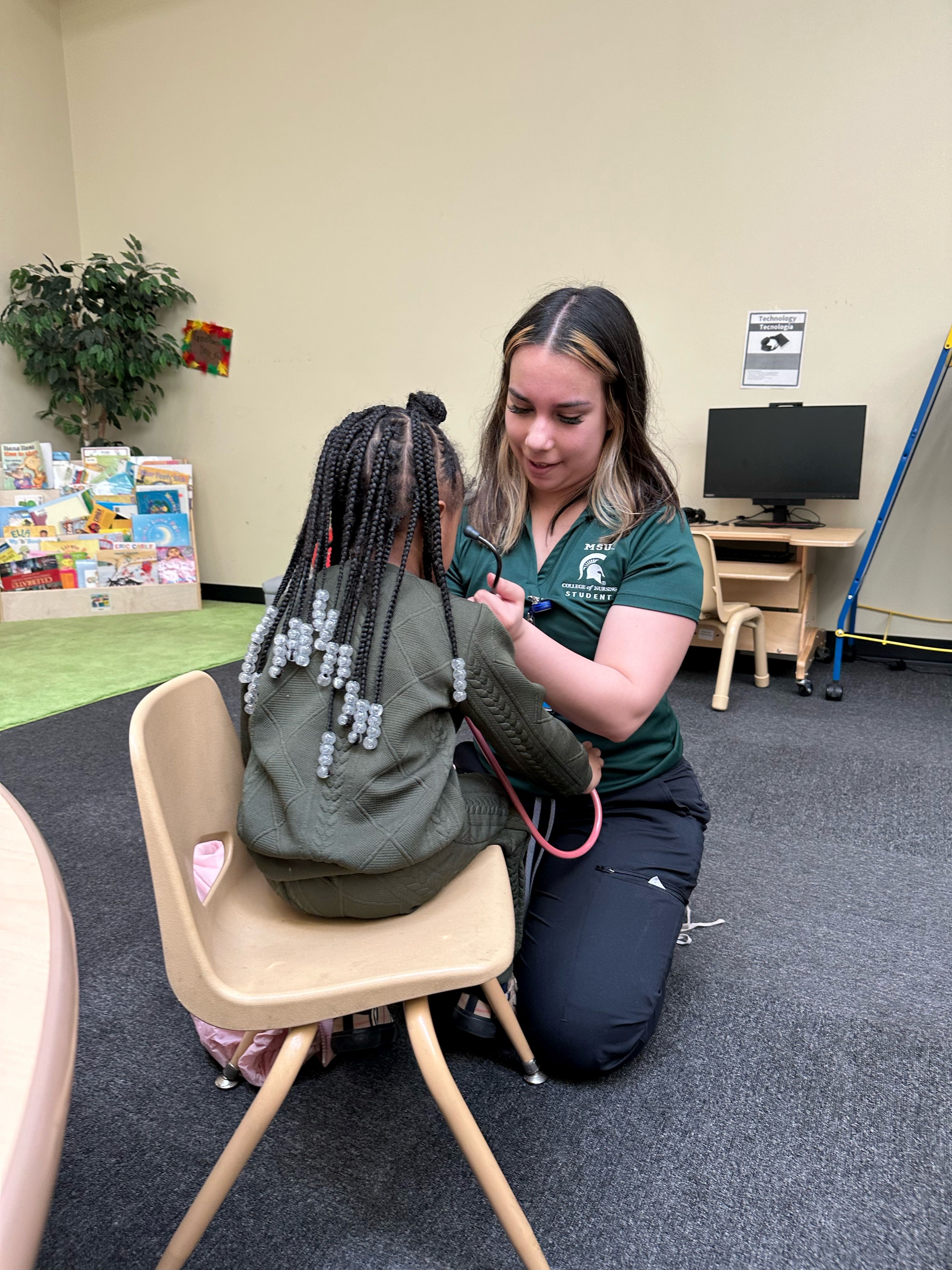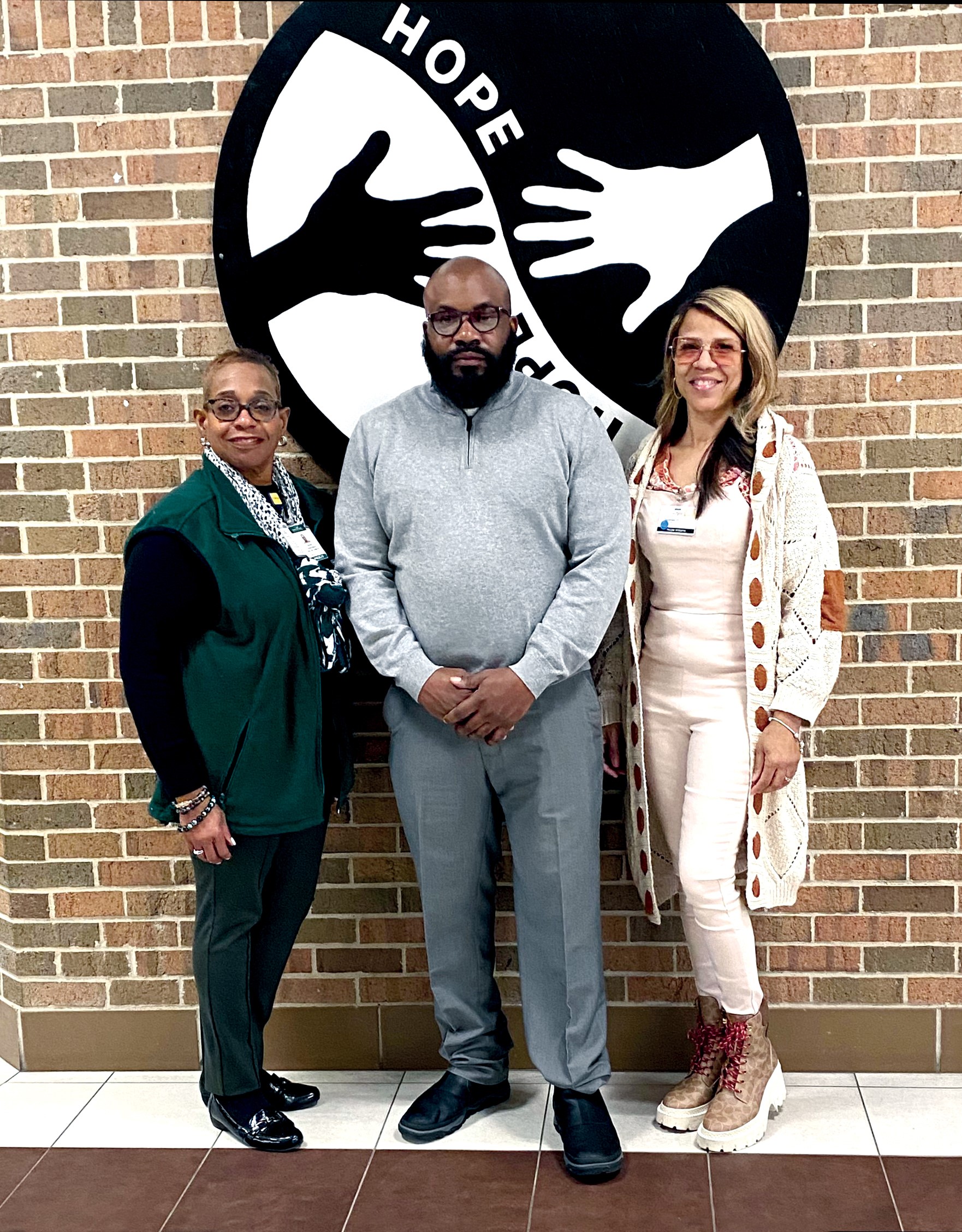Amid the happy hubbub of a preschool classroom after recess, MSU nursing student Lexie Salazar leans in with a stethoscope to listen to a 4-year-old’s lung sounds.
She’ll note any differences between the little girl’s breathing before and after her time playing outside on this unseasonably warm March day at Focus: HOPE’s Center for Children in Detroit. Founded in 1968, Focus: HOPE offers early education and other programs including job training and senior services aimed at countering the effects of racism, poverty, and social injustice.
While the balmy temperatures put a smile on the children’s faces, they can also trigger breathing problems for students with asthma. That’s a growing concern for educators at the Early Learning Program at Focus: HOPE, who saw the number of students ages 0-5 with asthma rise to 19 this school year.
The increase mirrors a citywide trend. A 2021 Michigan Department of Health and Human Services report revealed that 15.6% of Detroit children have asthma, compared with 8.6% statewide.
In response, MSU Assistant Professor Rhonda Conner-Warren and her community health clinical students are partnering with Focus: HOPE to document asthma triggers and equip parents, caregivers, and teachers with resources and information aimed at mitigating the effects of the disease.
“Everything we’re doing is meeting competency (requirements),” said Conner-Warren. “But more importantly, we’re meeting the care concerns of the community.”
Working together to confront childhood asthma
Conner-Warren lectures at MSU on Tuesdays and directs clinical rotations with two groups of 7-8 students on Mondays and Wednesdays at Focus: HOPE. In addition, she provides medical care to children every Thursday as a nurse practitioner.
As she plans clinical rotations for her fourth-year community health students, Conner-Warren starts by asking agency leaders to identify their top concerns. “My philosophy is that it should be a win-win for us all—meaning—‘what does your agency need?’,” she said. “In this season it’s the issue of asthma.”
Asthma is a chronic lung disease that inflames and narrows the airways, resulting in chest tightness, shortness of breath, coughing, or wheezing.
The prevalence of childhood asthma has increased in Detroit and throughout Wayne County. Detroit is the fifth most challenging place to live with asthma in the nation, according to the 2023 Asthma Capitals report by the Asthma and Allergy Foundation of America. The rankings are based on asthma prevalence, emergency department visits due to asthma, and asthma-related fatalities. Risk factors include poverty, exposure to air pollution, pollen allergy, lack of access to specialists or health insurance, and poor indoor air quality, according to the study.
The report’s findings are borne out at Focus: HOPE. “We noticed so many kids coming here with asthma,” said Waymond Hayes, director of early learning and youth development. “If they have asthma, we’re responsible as a program to ensure that we provide the best services throughout the day.”
Nicole Williams, coordinator of health and nutrition, works closely with Conner-Warren to make that happen. When children are enrolled in the Head Start program, they receive a physical exam, hearing/vision checks, and lead screening as part of federal requirements.
For students with asthma, Conner-Warren directs MSU nursing students to note any changes in their breath sounds before and after they play outside. Additionally, they track the student’s age, albuterol inhaler use, air quality that day, and the air quality in the student’s zip code.
“The goal is to have a personalized report card for each family for their particular child at the end of the rotation,” said Williams. That in turn can help parents and teachers understand asthma triggers and when/how frequently to use an inhaler, for example.
On warm days, checking the children’s lungs before and after outdoor play can help determine if higher temperatures cause an uptick in symptoms, Conner-Warren said. “If so, we may want to say to a parent, you may want to consider giving them albuterol before they come to school because these things have been impacting their breathing,” she said.
“That’s a far better plan of care versus having, ‘Oh gosh, they’re wheezing’,” she added.
That data can potentially be used for a grant application for asthma management and education for families to improve health outcomes, Williams said.
The MSU students gain a greater understanding of the factors influencing children’s health. At the same time, “We’re [teaching them that] just because you have asthma doesn’t mean you can’t play and run around,” she said. “And just because you have a chronic illness doesn’t mean you don’t deserve the best education around.”
A safe haven for children and families
The asthma project is just one example of the fruits of the collaboration between MSU and Focus: HOPE. Last spring, Conner-Warren asked Williams for her input on a clinical focus for her fourth-year nursing students.
“I had a diabetic student, and the mom was facing challenges,” Williams said. She recalls thinking, “This [clinical] could be a perfect support for them.”
The student, Miracle, had been diagnosed with Type 1 diabetes at age 11 months. At school, the staff monitored her blood sugar levels and her food portions and had seen improvements. Miracle’s mother, Marcella Thompson, who works at Focus: HOPE, has two older sons, and felt overwhelmed.
“She came up to us during that clinical and said, ‘I need help,’” Conner-Warren said. Conner-Warren’s students, working with the Focus: HOPE staff, came up with ideas for healthy snacks, portion control, and apps the family could use to monitor nutrition.
The second cohort of students built on that foundation, creating meal plans and a presentation on diabetes for staff training. In addition to helping Miracle’s family, the resource can be shared with other families.
Recently K.D., another student with Type 1 diabetes, enrolled in Head Start. Thompson now helps care for both K.D. and her daughter, now 3, by monitoring their blood-sugar levels and insulin dosages. “Now it’s her time. She’s giving back to this family,” said Conner-Warren. “And it’s a beautiful thing to see.”
Together, MSU and Focus: HOPE can help ensure all children—regardless of health issues or disabilities—can get a preschool education, Hayes said. He recalls the relief on K.D.’s mother’s face when she learned her son could attend preschool. “I always say, ‘This is a safe haven.’ You can bring your child here.”
“We at Focus: HOPE Early Learning have what we call a village mentality,” said Williams. “We treat the children who come to us as we would treat our own in a similar predicament.”
Conner-Warren considers Focus: HOPE a “hidden gem” in the community and said she feels grateful to spend time there as a professor and a clinician. She shares her enthusiasm with her students, reminding them that as they near the completion of their nursing degree, this is a time to give back to the community.
“What I try to impart to them is that you have a gift, and you have a talent, and you have a skillset, and you should always give back,” she said. “I always say that I’ve learned so much more from my patients that has built me up and strengthened me.”
Out on the playground, as Miracle and K.D. played with their friends, teacher Wanda King called the collaboration “a blessing.”
“I love (Conner-Warren),” she said, noting she appreciates being able to discuss any needs or concerns. “She always comes in and welcomes the children and the families and the staff.”
“We become greater together,” said Conner-Warren, who finds deep fulfillment in helping children and families live their best lives despite socioeconomic, health, and other challenges. “That’s when the greatness comes.”
This story originally appeared on The Engaged Scholar eNewsletter website.
